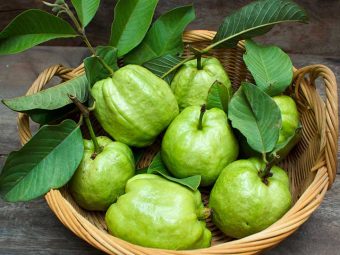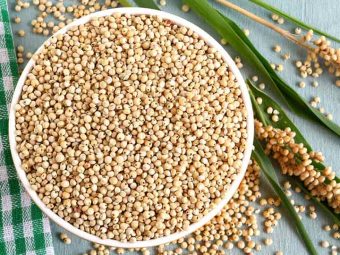[ad_1]
Medium-chain triglycerides (MCTs) are found in commonly available oils. MCT oil is a supplement that has these fats. This supplement is fast becoming popular for its purported benefits in weight management.
But how else can MCT oil benefit you? In this article, we look at expert opinions about the various benefits of MCT oil, its possible risks, and how you can use it with a keto diet. Continue reading.
MCTs, The Types, And MCT Oil
Scientifically speaking, MCTs (medium-chain triglycerides) are fatty acids with chains of about 6-12 carbon atoms. Thus, they are relatively easier for the body to digest than long-chain fatty acids.
Ana Reisdorf, a registered dietitian, talks about the different types of MCT oils.
“There are 4 main types of MCT oils. These are:
- Caproic acid (6 carbon molecules): has a very strong smell, isn’t usually used in supplements or food
- Caprylic acid (8 carbon molecules): used by the body to create ketones, also has antibacterial properties
- Capric acid (10 carbon molecules): antibacterial and immune-boosting properties, effectively used for energy
- Lauric acid (12 carbon molecules): the main MCT found in coconut oil, antibacterial properties, may help improve insulin sensitivity.”
Of these, the most common ones that you can find in use are the caproic and caprylic acids. The natural sources of MCTs are human breast milk, oils like coconut and palm, and full-fat cow or goat milk.
These sources generally have both MCTs and long-chain triglycerides, both of which are saturated fatty acids. It is important to note here that no natural source has 100% MCT content. For example, coconut oil has a maximum of only 54% of MCT content. MCT oil is made by processing palm and coconut oils.
Ms. Reisdorf says, “Coconut oil contains mostly lauric acid. Most MCT oils on the market are caprylic and capric acids; these are the ones that are best for helping you get into ketosis.”
How many body functions can one oil supplement affect? Read on to learn about the health benefits of MCT oil.
Science-Based Health Benefits Of MCT Oil
The right kind of fatty acids can affect a lot of bodily functions. MCTs are that kind because they:
1. May Be Healthy For The Heart
Medium-chain triglycerides are easily absorbed into the bloodstream and go directly to the liver. Because of this property of MCTs, MCT oil has been shown to reduce bad cholesterol (LDLs) and increase the levels of HDL cholesterol (which are good for the heart) (1).
Felicia Newell, the Medical Advisor for Medical Solutions BCN, says, “MCTs have a number of properties that may be beneficial in preventing atherosclerosis (aka the hardening of the arteries), which can lead to heart disease.”
There is also scientific evidence showing that MCTs can help reduce inflammation, thereby protecting the heart muscles (2).
2. May Help In Regulating Diabetes
Dr. Mahmud Kara, the founder of KaraMD, says this about the impact of MCTs on diabetes management.
- “MCTs can help the body make more ketones compared to long-chain forms, which are important for people with diabetes.
- Ketones can help regulate insulin levels and break down food molecules in the body that can then be used for energy.
- Because it is more easily absorbed, MCT oil can also help people who struggle with nutrient absorption due to issues with the pancreas (the primary organ affected by diabetes).
- Furthermore, MCT oil may indirectly help people with diabetes because the foods that are high in MCT oil can help us feel fuller faster, which in turn can prevent overeating and unnecessary spikes in blood sugar levels.”
3. May Help Improve Energy Levels
Like Dr. Kara states, ketones being produced in the body improve energy levels. Mitochondria are the powerhouse of the cell. One study has particularly found how MCTs improve the metabolism of mitochondria, increasing energy production in the cells and improving your body’s energy levels (3).
4. May Help Reduce Fat Build-Up
Peptide YY and leptin are two hormones responsible for satiety after a meal. A study proved that MCTs increase the production of these two hormones, thereby increasing the feeling of fullness. MCTs also reduce fat build-up in the body, which is ideal if you are an athlete (4).
5. MCT Oil May Promote Weight Loss
Studies have shown that MCTs are absorbed directly into the bloodstream and do not need to be digested (5). Instead, they go directly to the liver, adding no extra fatty layer to tissues. The improved energy levels and reduced fat build-up are a perfect combination when one is looking to reduce weight.
“MCT oil is increasingly popular among athletes, as these medium chains are more easily absorbed, can contribute to weight loss, and are a high-quality energy source,” says Anthony Puopolo, the Chief Medical Officer at RexMD.
6. May Help Reduce Inflammation
Dr. Kara has this to say about how MCTs affect the symptoms of Alzheimer’s disease.
“Chronic inflammation is the root of all evil. Many health issues such as heart disease, cancer, diabetes, and cognitive disorders like dementia and Alzheimer’s, start with inflammation. MCT oil can serve as an anti-inflammatory because it can help break down pro-inflammatory cytokines.”
A study reported an improvement of cognitive function in people with Alzheimer’s with a dosage of 30g of MCT oil per day (6).
How can you best extract these benefits? The next segment talks about using MCT oil in a keto diet.
How To Use MCT Oil In A Keto Diet
Incorporating MCT oil into your diet is pretty simple. The oil remains fluid at room temperature, and hence, you can simply mix it into any meal or beverage you consume.
Remember that MCT oil is not suitable for cooking because the molecules break down at higher temperatures.
Some ways of using MCT oil in your keto diet are:
- Mixing it into your daily coffee
- Using it along with olive/other oils while making salads
- Blending it in with your smoothie or with your pre-workout beverage
As seen in the benefits, MCT oil has the characteristic of promoting ketone production. Hence, it is the better staple for you to include in your ketogenic diet.
About the dosage, “There isn’t a specific recommended dosage. Most products recommend 1-3 tablespoons per day. Start with ½ a tablespoon as MCTs can cause digestive problems if you are not used to them.” says Ms. Reisdorf.
MCT Oil Risks: Could MCT Oil Be Bad For You?
Ms. Newell has this to say about the possible short-term effects of using MCT oils in excess.
“In general, it is safe to use MCT oil in moderate amounts. However, long-term and excessive use could have risks. Some of the negative potential health impacts include:
- As with any other fat, it is still high in calories. Consuming more calories than your body naturally needs daily can lead to weight gain.
- Large amounts of saturated fat may raise harmful cholesterol levels.
- MCTs could stimulate the release of hunger hormones, making you overeat.
- Large doses could lead to fat buildup in the liver.”
Ms. Reisdorf agrees, saying, “One of the major short-term risks of MCT oil is diarrhea or gas that can be caused by taking too much.”
Conclusion
MCT oils are beneficial overall when you wish to get on a proper keto diet. They contribute to major fitness goals like weight loss, fat burning, and having higher energy levels without consuming too many fatty foods. They even contribute to keeping your heart healthy and your cholesterol and blood sugar levels in check.
You can even add them to any food you wish to eat on your diet. Just remember not to heat MCT oils. That said, the side effects of these oils aren’t too many (and only short-term). Hence, you can start incorporating these oils in your diet today.
Key Takeaways
- MCT oils may help reduce bad cholesterol and raise good cholesterol levels.
- They also can promote satiety and prevent overeating.
- This way, they can help with weight loss.
- Using the oils in a keto diet can give you the maximum benefit.
Sources
Articles on StyleCraze are backed by verified information from peer-reviewed and academic research papers, reputed organizations, research institutions, and medical associations to ensure accuracy and relevance. Read our editorial policy to learn more.
- Medium-Chain Triglycerides Lower Blood Lipids and Body Weight in Streptozotocin-Induced Type 2 Diabetes Rats
https://www.ncbi.nlm.nih.gov/labs/pmc/articles/PMC6115836/ - Medium Chain Triglyceride (MCT) Oil Affects the Immunophenotype via Reprogramming of Mitochondrial Respiration in Murine Macrophages
https://www.ncbi.nlm.nih.gov/labs/pmc/articles/PMC6915711/ - Medium Chain Triglycerides enhances exercise endurance through the increased mitochondrial biogenesis and metabolism
https://www.ncbi.nlm.nih.gov/labs/pmc/articles/PMC5805166/ - Impact of medium and long chain triglycerides consumption on appetite and food intake in overweight men
https://www.ncbi.nlm.nih.gov/labs/pmc/articles/PMC4192077/ - Physiological Effects of Medium-Chain Triglycerides: Potential Agents in the Prevention of Obesity
https://doi.org/10.1093/jn/132.3.329 - Can ketones compensate for deteriorating brain glucose uptake during aging? Implications for the risk and treatment of Alzheimer’s disease
https://pubmed.ncbi.nlm.nih.gov/26766547/
Related
LATEST ARTICLES
[ad_2]

















